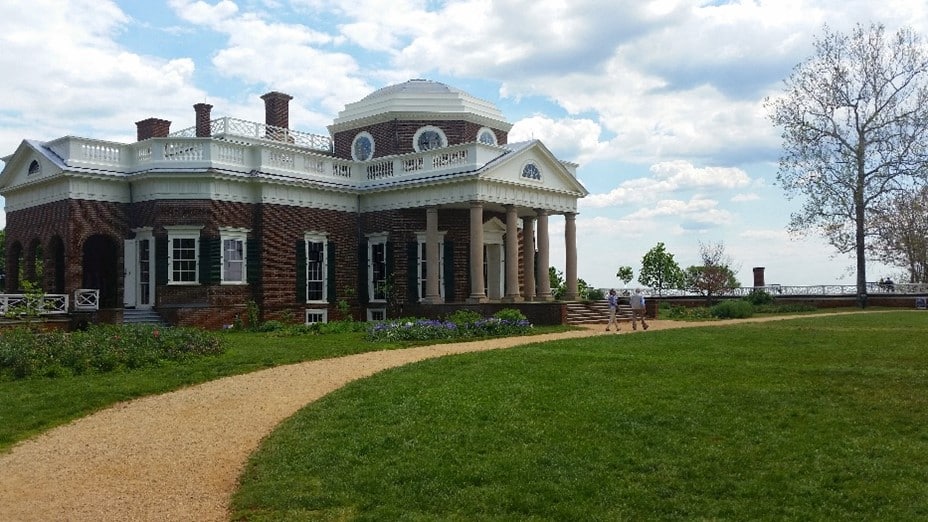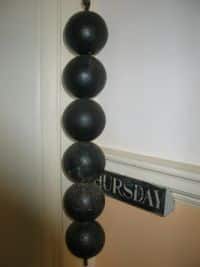The Monticello Clock

In addition to being a Founding Father, the architect of the University of Virginia (my alma mater), and a philosopher of democracy, Thomas Jefferson was an inventor, known for his precision and innovation. On this July 4th, as we celebrate our independence and the empowering language of the Declaration of Independence, we are also reminded that Jefferson breathed his last breath on July 4th, 1826. Some find that fact fitting, others find it ironic, and even others use the fact to support the myth of the man.
Monticello is the home designed by Thomas Jefferson, a kind of Magnus Opus to all things Jeffersonian. I have visited often to explore the insights, the brilliance, and the flaws of the man who created it. Because I believe our home is where we go, first and foremost, to be ourselves, I have looked for signs of Jefferson telling us who he was. His books, his inventions, his thoughtful and elegant designs are all outputs of his mind; his critical thinking skills are on full display. But so, too, is his humanity.
In the foyer of the Monticello, is a unique clock—a wall clock with a series of sixteen-pound cannonballs that descend on a rope and along the wall indicating the days of the week, written for all to see. The problem was that Jefferson mismeasured the ceiling height so that the entire week could not be posted on the wall. His solution was to cut a hole in the floor to allow Saturday to sink into the basement. (I can relate—I sometimes feel like sinking into the floor by the time I get to Saturday and hide from reality.)

(Photo Credit: Monticello.org)
I initially found this mismeasurement by a man drawn to precision to be quaintly funny even as he designed a rather clever solution. However, the clock was also attached to a Chinese gong that was struck upon the hour and could be heard for miles, to the ends of his plantation—to those laboring in the fields, to those he owned. Ironic perhaps: to those who lacked the basic ownership of their own time, Jefferson reminded them—on an hourly basis—of the time.
I will neither demonize nor attempt to justify Jefferson’s contradictory positions and actions about slavery and the equality of man. His words, and actions, speak for themselves.
“We hold these truths to be self-evident, that all men are created equal, that they are endowed by their Creator with certain unalienable Rights, that among these are Life, Liberty and the pursuit of Happiness.” Declaration of Independence 1776. Written by Jefferson, owner of five hundred souls in his lifetime. Gong.
“No person hereafter coming into this country shall be held within the same in slavery under any pretext whatever.” Jefferson’s proposed language for the Virginia Constitution, 1776. Not adopted by the General Assembly. Gong.
“But, as it is, we have the wolf by the ear, and we can neither hold him, nor safely let him go. Justice is in one scale, and self-preservation in the other.” Jefferson to John Holmes, (discussing slavery and the Missouri question), April 22, 1820. Gong.
“Commerce between Master and Slave is a perpetual exercise of the most boisterous passions, the most unremitting despotism on the one part, and degrading submissions on the other…Nothing is more certainly written in the book of fate than these people are to be free.” Notes on the State of Virginia, Thomas Jefferson. Gong
Clearly, Jefferson struggled intellectually with the institution of slavery while at the same time benefiting economically from it all. Scholars with more knowledge than me have more intelligently tussled with these contradictions.
I will admit to confusion as I vacillate between admiration and scorn. Then again, little about history is simple, thus the reason for our fascination. As I wrestle with my interpretation of Jefferson the man, the scholar, the inventor, the plantation owner, I refuse to hide Saturday in the basement. I prefer to wrestle with the loud gongs, instead.



Thought provoking. Jefferson was certainly complex.